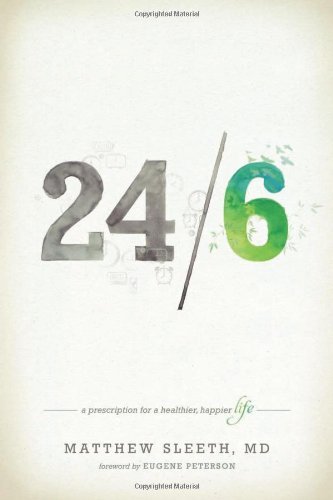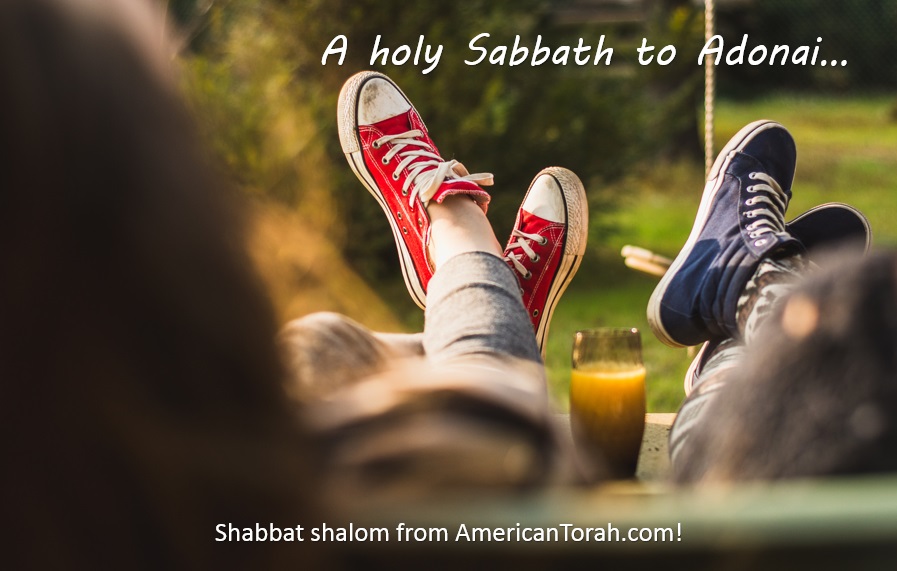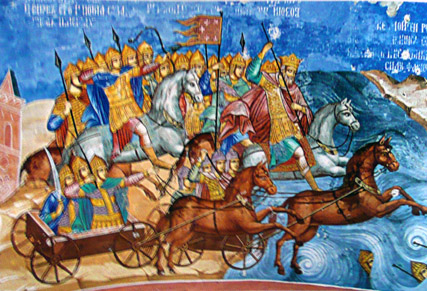Matthew Sleeth is a former emergency room doctor who returned to the faith of his childhood during a time of personal crisis and eventually became a pastor. In the course of that journey, he discovered the personal value of the weekly Sabbath and wrote 24/6 to share how it changed his life.
Dr. Sleeth gives a lot of great advice and illustrates many ways that a weekly Sabbath can enhance a person’s life. I recommend this book to everyone!
It’s missing one really important thing though.
The Seventh Day
Sleeth touches on it here and there, but I think one historical misconception prevents him from really connecting the dots. Every benefit he says that a person can derive from keeping a personal weekly sabbath also applies to the whole community and even to an entire nation, when the whole people keep the Sabbath on the same day.
The many scripture passages quoted at the end of the book repeatedly underscore this truth. In fact, the Bible’s instructions on keeping the Sabbath require that everyone keeps it on the same day. There are probably dozens of examples, but let me give you just three:
Then the LORD said to Moses, “Behold, I am about to rain bread from heaven for you, and the people shall go out and gather a day’s portion every day, that I may test them, whether they will walk in my law or not. On the sixth day, when they prepare what they bring in, it will be twice as much as they gather daily.”
Exodus 16:4-5
In this chapter of Exodus, if anyone gathered more manna than their family could eat in a single day, then it rotted. However, on the sixth day, God told them to gather enough for two days. Then on the seventh day, the Sabbath, there was no manna, and the manna they gathered the day before didn’t rot. If anyone had decided they could keep the Sabbath on a day that was more convenient for them, they’d be out of luck. They would be forced to fast on the Sabbath because they gathered twice as much food on the second day instead of the sixth, and it rotted. Everyone had to keep the Sabbath on the same day, the seventh day of the week.
Six days you shall labor, and do all your work, but the seventh day is a Sabbath to the LORD your God. On it you shall not do any work, you, or your son, or your daughter, your male servant, or your female servant, or your livestock, or the sojourner who is within your gates.
Exodus 20:9-10
I don’t think it gets any clearer than this. By God’s direct command, everyone must keep the Sabbath on the same day, and not just any day, but the seventh day of the week. You can rest any day of the week, but it’s not God’s Sabbath unless it’s the seventh day, and you’re not keeping it if you are making other people work so that you can take the day off.
As soon as it began to grow dark at the gates of Jerusalem before the Sabbath, I commanded that the doors should be shut and gave orders that they should not be opened until after the Sabbath. And I stationed some of my servants at the gates, that no load might be brought in on the Sabbath day. Then the merchants and sellers of all kinds of wares lodged outside Jerusalem once or twice. But I warned them and said to them, “Why do you lodge outside the wall? If you do so again, I will lay hands on you.” From that time on they did not come on the Sabbath.
Nehemiah 13:19-21
Nehemiah castigated the city elders for allowing foreign merchants to sell their wares in Jerusalem on the Sabbath–not your Sabbath or their Sabbath, but the Sabbath–and then he closed the gates and threatened those merchants with bodily harm if they even camped outside the city gates on that day. He forced all residents of Jerusalem, Jew and Gentile alike, to keep the Sabbath on the same day, and chose guards from among the Levites, the tribe which had been specially chosen by God for their willingness to kill fellow Israelites for unfaithfulness, to make sure nobody violated his orders.
But Which Day Is the Seventh?
Sleeth asserts that we can’t know for certain which day of our modern week was the seventh of God’s Creation, but that’s not historically accurate. We know from Exodus 16 that the ancient Israelites knew which day was the seventh. God made sure they knew by not sending the wilderness bread of life on that day.
We also know that the Jews of Jesus’ day knew which day of the week was the seventh by the living Bread of Life. For Jesus’ death to have any atoning effectiveness, he had to live a perfectly sinless life, which means keeping the Sabbath in the way that his Father prescribed without error. Jesus kept the Sabbath on the same day that the Pharisees and Sadducees did, so we know beyond any reasonable doubt that they had it right.
The Romans had adopted the seven day week from the Semitic peoples they conquered in the Ancient Near East, and we know from the writings of Josephus that the day the Romans called Dies Saturni or Saturn’s Day. In English we now call that day Saturday, although much of the rest of the world calls it some variation of “Sabbath”: Subbota, Sabada, Shota, Asabsh, etc.
Despite popular belief, the centuries between the fall of the Roman Empire and the Renaissance weren’t peopled solely by ignorant, illiterate savages who forgot how to observe the stars or keep records. Governments and religious institutions of the Medieval era kept records throughout, and, although the months and years were sometimes adjusted to keep them in sync with the seasons, the continuous cycle of the days of the week was never interrupted in all that time. The Roman church held the first day of the week to be sacred, despite God’s explicit instructions, because they didn’t want to look Jewish, and so they ensured that everyone knew which day was Sunday. They also thereby ensured that nobody ever forgot which day was the seventh day.
The seventh day of the Creation week is still the seventh day of our modern week, and every attempt to deny that historical fact looks to me like someone looking for any excuse to do things their own way instead of God’s.
There Is Only One Weekly Sabbath
I know that some people have to work on the Sabbath, just like the priests did at the Temple. Somebody has to keep the lights on. Somebody has to be available to help if you get hurt. Somebody has to lead worship. Those people need to have the freedom to take an alternate day off from work and to offload those responsibilities onto someone else at times, but that still doesn’t change which day of the week is the Sabbath that God instituted.
Every day is a great day to gather and worship in Jesus’ name and everyone will derive great benefit from resting one day each week, no matter which day that is, but there is only one day that God set apart for his people to spend especially with him. If your husband or wife set aside a whole day just to be with you, do you think they’d mind if you showed up on a different day?
If you are requiring other people to do business, to clean your house, to wait your table, and to write your marketing copy on the seventh day of the week, then you’re not keeping the Sabbath, no matter on which day you have chosen to rest. The Sabbath was made for man, but so was marriage and procreation, and God hasn’t authorized anyone to make changes to these institutions that he created for our benefit.







